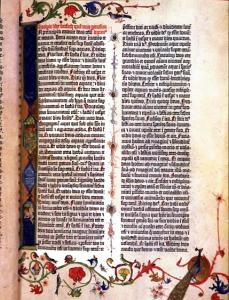
One must always be very careful not to over-generalize any statement about the Bible. When anyone begins a comment with the well-worn phrase, “the Bible says,” I have learned to duck! I know I am about to be hit between the eyes with a phrase designed to put me in my place, assign me to the deepest reaches of Hell, and win the argument for the speaker. This game is “Bible quotes beat all,” and may be played by any number of Christians, half-Christians, sort-of Christians, but most of all by Christians who think they have all the right answers to all the appropriate questions. I am being only slightly facetious, very slightly, I fear. My own denomination, United Methodism, has been playing “Bible quotes” for nearly fifty years now when it comes to the exclusion of LGBTQIA persons from full inclusion in the UMC. By roaring out the seven so-called “clobber verses” (you may look them up), we have gotten to the point where the “traditionalists” have usurped the entire denomination, attempting to bend it to their majority will. And mostly on the basis of a supposed “win” at Bible quotes.
This reality is both sad and ludicrous all at once. After all, the game of Bible quotes assumes a sort of fundamentalism to play. But the dangers of fundamentalism in the strictest sense are appalling indeed. If such folk play Bible quotes, then children who sass their parents are subject to death by stoning, women must remain silent in churches (quite awkward for all those ordained women now pastoring thousands of churches!), and the delights of lobster, crab, and shrimp are to be eschewed. As for the latter, I was once a pastor in Louisiana, and if I had ever had the foolishness to deny the consumption of shellfish to my parishioners, my brief two-year stint as their pastor would have been far shorter, I assure you.
Here is a fact that too often is quite forgotten when people turn to the scripture for their pronouncements: the 66 books of our Protestant canon were not written all at once or at the same time! Think about that! The very oldest materials in the Hebrew Bible (perhaps Judges 5 or Exodus 15:20-21 and surely P.29) were composed before the start of the 1st millennium BCE, over 3000 years ago. The latest New Testament writings may be perhaps the book of Revelation or one of the shorter letters like Jude. They did not appear until very late in the 1st century CE or early in the 2nd. Thus, the Bible you hold in your hand comprises over 1000 years of thought and reflection. It is crucial to conclude from that brief Bible history that ideas about whatever subjects are raised in its pages are bound to be quite different as the contexts of the compositions change over time. Let us take, for example, the ways that the person of God is presented to us over that vast time.
Gen.1 provides for us a portrait of a God of mysterious immensity, who creates the universe merely by the sound of the divine voice. Gen.2 on the other hand, draws a God who kneels in the muddy clay, forming human beings on a potter’s wheel, one by one, breathing into each clay figure the breath of life, animating them until the breath is withdrawn in death. The God of Gen.3 offers the human gardeners a choice of eating or not eating from the forbidden tree, a God willing to allow real freedom to the creatures, but Is.45:7 thunders that God creates both weal and woe, and you and I have no freedom to raise any objections to this overwhelming God. I could go on with this game of Bible quotes, as could you, but the point is that all of these biblical statements possess important clues for understanding the ones who wrote them, and why, as well as important information for us, the modern readers, as we seek to illuminate and enrich our own journeys of faith. If I limit myself to one of the quotes only, I at the same time limit my fuller understanding of what the whole Bible offers me about any given subject.
I provide this rather longer introduction to today’s passage to context what I am about to say about the quite astonishing portrait of God that we find here in Hosea. We know quite a bit about the life of this 8th century BCE prophet, if we assume that the first three chapters contain genuine biographical information. Whether that is true has been the source of much scholarly debate. I tend to believe that there is some biography here, at least the basic notion that Hosea became convinced that God was calling him to marry a prostitute, and also, when she inevitably returned to her trade after their marriage and after three children, was called to seek her out again and again to come back to him as wife. In this living parable, Hosea saw how God saw Israel, wayward and wanton, yet deeply loved by God no matter what. (I fully recognize that this tale is deeply problematic concerning its portrayal of women, but I still find it quite moving as a portrait of the God who will simply not give up on us.)
Chapter 11 summarizes this story of God and Israel in frankly unforgettable ways. I am especially interested in vss.8-9 today. Vss.5-7 offers the usual prophetic lament that Israel has abandoned faith in YHWH and will certainly pay a heavy price. But there is a sharp and surprising shift in tone as we read vs.8. “ How can I give you up, Ephraim (a euphemism for Israel); how can I hand you over, Israel? How can I make you like Admah? How can I treat like Zeboiim (both cities connected in the tradition to Sodom and Gomorrah)? My heart (seat of will and intelligence) changes within me; my womb warms up. I will not employ my ferocious anger; I will not again destroy Ephraim! Because I am God, not a male, the holy one among you, I will not come in fury.”
Hosea, perhaps under the influence of his extraordinary relationship to his wife, Gomer, portrays God here as quite directly feminine; YHWH has a womb, and YHWH is not a male. Though the NRSV follows most translations and renders the Hebrew as the generic “mortal,” the fact is that this word nearly always means male, most especially in the famous Gen.2 story where male and female are created. Exactly why Hosea pictures his God like this is not easily understood, since 8th century BCE Israel was clearly a patriarchal society. Yet, the proper translation of the passage makes it plain that YHWH is much more female than male according to Hosea.
Does that mean that God is to be viewed as female in the Bible? Hardly! But it does say that to see the biblical God as only male is impossible, given Hosea’s portrait of his God. If one is to ask after the biblical picture of God, Hosea’s portrait is as important as any other to provide a richer and fuller insight into the mysterious God we worship and praise.
Let me summarize what I have tried to say today: context is crucial as we approach any text from the Bible. We cannot allow ourselves to quote willy-nilly words and phrases from disparate locations and assume that we have now captured the Bible’s last word on any given subject. I would remind my traditionalist United Methodist colleagues that quotations from the Bible—from Leviticus, Romans, and 2 Corinthians— hardly exhaust what the Bible says concerning the complex issues surrounding same- gender relationships, even if such ancient texts have finally anything to add to our modern conversations about gender identity, a conversation that has been greatly enriched by scientific advances in our understanding of human gender and sexuality. I doubt I have ever met a true biblical fundamentalist, even among those who would call themselves such. A true fundamentalist would be a very dangerous person indeed! The Bible needs desperately to be heard in its fullness, across its many reflections, before it may be employed as part of a serious modern discussion of any question. I urge caution on any who read the scriptures lest it be used to wound and exclude, rather than to heal and include, which, I believe, is its true and final purpose.
(Images from Wikimedia Commons)










